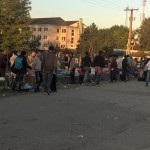 More states in the United States are announcing their reluctance to accept refugees from Europe, and their thinking is understandable. Right after Labor Day when the refugees hit the town of Rosce on the Serbian-Hungarian border, I was with a friend from Bratislava driving across Hungary with supplies for them.
More states in the United States are announcing their reluctance to accept refugees from Europe, and their thinking is understandable. Right after Labor Day when the refugees hit the town of Rosce on the Serbian-Hungarian border, I was with a friend from Bratislava driving across Hungary with supplies for them.
Attila Molnar had his car loaded with food, water and clothes. Behind us was a delivery van with six cases of blankets. At Szeged, Hungary, 17 kilometers from Rosce, we met local citizens doing the same thing. As we talked, I asked a young man (who later identified himself as a teacher at the university) why he was doing this, and he looked at me as if surprised by my question, and said simply, “They’re human beings, too, aren’t they?”
2 demonstrations
At that same moment in Bratislava, there were two demonstrations happening, one supporting the refugees, the other against. On this day the supporting group was the largest. The previous week those against were in the majority. And around us in Szeged, while the people we saw were supporters, there were others.
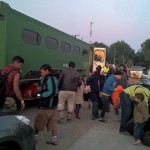 We were told that the Hungarian police were loading the people in buses and transporting them across the country — three or four hours — to the Austrian border, where they could get on trains for Germany. So we turned around and headed in that direction. At the border the police were unloading the people into a field 10 kilometers (six miles) inside the Hungarian border and then had a line of local taxis waiting to take them the last 10 miles to the train station — for a fee. Almost immediately local citizens had begun showing up in their private cars and offering free transport. There was a clear tension between them and the police.
We were told that the Hungarian police were loading the people in buses and transporting them across the country — three or four hours — to the Austrian border, where they could get on trains for Germany. So we turned around and headed in that direction. At the border the police were unloading the people into a field 10 kilometers (six miles) inside the Hungarian border and then had a line of local taxis waiting to take them the last 10 miles to the train station — for a fee. Almost immediately local citizens had begun showing up in their private cars and offering free transport. There was a clear tension between them and the police.
The drop-off point was a narrow dirt road perhaps 500 meters long with a make shift turnaround at the end. We watched a large, green police bus arrive and unload its passengers, then try, with difficulty, to turn around. At that same time two more buses arrived. And then two more. And then two big double buses, all into the narrow road. Locals in their cars were in the melee as well. Someone in a car would roll down their window and say: “I have room for four!” People would immediately surround them. Then the challenge was to get back to the main road.
Exhausted families
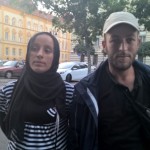 They looked the way you would expect refugees to look. We have all seen them on television — mostly families, tired, carrying or wearing everything they own. Very tired. Children crying; parents being very quiet. I stood with a young mom and dad with two small girls, perhaps five or six, and an older parent. My heart immediately went out to them. Through the crowd I saw the scene repeated over and over, families huddled together, exhausted.
They looked the way you would expect refugees to look. We have all seen them on television — mostly families, tired, carrying or wearing everything they own. Very tired. Children crying; parents being very quiet. I stood with a young mom and dad with two small girls, perhaps five or six, and an older parent. My heart immediately went out to them. Through the crowd I saw the scene repeated over and over, families huddled together, exhausted.
But also in the crowd were others who looked different, not like people forced from their homes by war. They were people from Afghanistan and Pakistan and some from Africa who were simply trying to get to a better life. More “emigrant” than “refugee.” And then I saw four young men standing together looking very different than any of the others, and I thought, “Those guys are thugs!” My feeling was that they were polluting the pool.
Alongside the road was a long waist-high bench with supplies laid out end-to-end. First bags and backpacks, then coats, then clothes, then food and then water. Volunteers were helping. Everything was orderly, quiet. As evening arrived and the temperature began to fall, looking across the line of supplies into the field beyond, I saw tents begin to pop up. Again it was locals who showed up and in minutes there was a small tent village, an evening refuge. Watching, emotions swelled in me that anywhere in the world where people are suffering, other people will rise. After all, “we’re all human beings, aren’t we?”
Compassion for all?
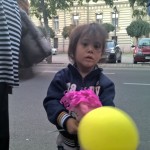 I sat down on the ground with the two little girls, now past tired and past crying, they were screaming and fighting. Mother, having nothing left to offer, was silent. It was so natural for me to feel compassion for them. Deep, genuine compassion. Then I had the thought, “Bill, you are proud of feeling compassion! Well, aren’t you just the most swell person!”
I sat down on the ground with the two little girls, now past tired and past crying, they were screaming and fighting. Mother, having nothing left to offer, was silent. It was so natural for me to feel compassion for them. Deep, genuine compassion. Then I had the thought, “Bill, you are proud of feeling compassion! Well, aren’t you just the most swell person!”
Through the fence I could imagine the faces of those who were angry and threatening violence toward those for whom I was feeling such compassion. And I thought, “they arrived in their place just like the refugees. They did not choose it. They didn’t choose to be angry. They had been pushed to that place by events in their own lives. They have the same heart and soul as the refugees. And me. If you are such a swell person, Bill, how come you are not feeling compassion for them?
So I tried. And could not. I really tried.
As Attila and I drove back to Bratislava, I asked him the same question I had asked the young man in Szeged. Why are you doing this?
Do something good
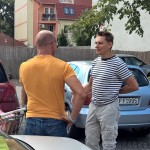 His first response was “I don’t want these people to think all Hungarians are jackasses!” A few minutes later he added “When Mirka (his beautiful two-year-old daughter) is older and she asks me what I did when the refugees were here, I want to be able to say that I did something.”
His first response was “I don’t want these people to think all Hungarians are jackasses!” A few minutes later he added “When Mirka (his beautiful two-year-old daughter) is older and she asks me what I did when the refugees were here, I want to be able to say that I did something.”
In the end, of course, I had no answer. We all want to help those who have been hurt. And we all want to protect our own families from those who would hurt us. The natural instinct is to let the latter block out the former, as if those are the only two choices.
Perhaps the best we can do is to dig down under as many layers of ourselves as we can and find the best person we are. And then do whatever we must. It will not be any more perfect than we are. After all, we are only human, aren’t we?
More Conversations
[cplw category=”9″ width=”800″ height=”300″ effects=”scrollVert” posts_to_show=”4″ time=”3000″ sort_by=”rand” excerpt_length=”8″ thumb_width=”75″ thumb_height=”75″ date_format=”F j, Y” display=”title,excerpt,thumb” order=”desc”]
